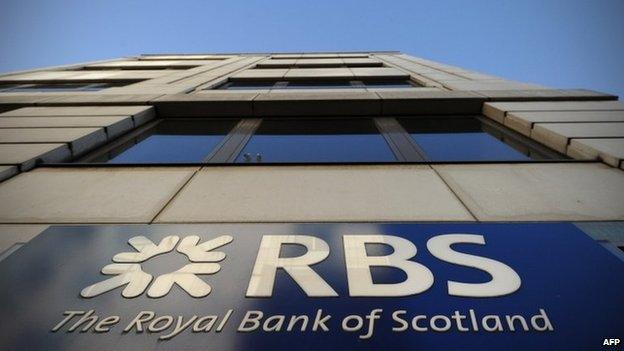RBS: An IT problem it really doesn’t need
- Published

The word seems almost benign - a "glitch" affecting computer systems at the Royal Bank of Scotland.
But "glitch", when it involves payments to individuals and businesses likely to total many millions of pounds, does not do the issue justice.
RBS needs another technical malfunction leaving hundreds of thousands of customers without a proper understanding of their bank balance like it needs another chief executive called Fred Goodwin.
That is, not at all.
RBS insists the problem, which involves RBS itself as well as NatWest, Ulster Bank and Coutts (banks RBS owns), will be resolved by Saturday.
Which appears a relatively relaxed timetable, to put it mildly.
Andrew Tyrie, the chairman of the Treasury select committee, described the four-day delay as "unacceptable".
"Restoration of payments should be a top priority," he said.
"It is crucial for those in the greatest financial need and also those who find it difficult to go to a branch.
"These failures should concern both the conduct and prudential regulators."
The regulators, the Financial Conduct Authority (FCA) and the Prudential Regulation Authority (PRA), will certainly be taking a close interest.
In November last year, RBS faced the biggest fine in retail banking history when the FCA and the PRA hit the bank with a £56m bill.
It was punishment for a major computer meltdown two years earlier - again described as a "glitch" - which affected 6.5 million customers.
Similar to today, in that case payments were not processed, meaning that wages were not paid and bills were left outstanding. Individuals and businesses were affected.
At its most basic, customers did not know how much money they had and were locked out of their accounts.
On top of the fine, RBS had to pay more than £70m in compensation.
Admittedly, today's problem is not of the same magnitude, and the affected 600,000 payments should been seen in the context of the 20 million transactions a day processed by RBS.
But after the major failure of 2012, which dragged on for weeks, again RBS has revealed that its technological processes lack essential robustness.
It has long been a problem across banking - archaic computer systems bolted together through a series of mergers and acquisitions which are out-of-date and too complicated to run.
A senior executive at RBS once described the bank's computer systems as resembling "15 different types of spaghetti".
It has been an under-resourced area for far too long, out of the public glare and too easily dismissed as a problem to be fixed "tomorrow".
Well, tomorrow came and went a long time ago, and RBS now insists that it is giving its technology the attention and the resources it deserves.
But with the government looking to start selling its 80% stake in RBS, the bank will need to reassure investors that it can service the, frankly, pretty simple banking needs of its customers without a "glitch".